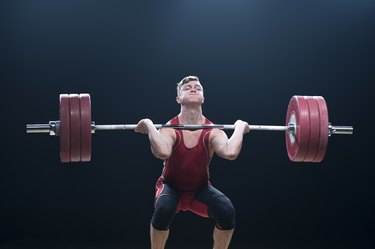
If you're a fan of gains, then you know the pain you feel today is the strength you feel tomorrow — unless that pain is in your testicles. Yes, it's possible to develop testicular pain after working out or lifting a heavy object. Here are the reasons behind the pain — and what to do for relief.
Read more: Testicular Pain When Running
Video of the Day
Video of the Day
Possible Causes
The Mayo Clinic says that the testicles are a sensitive part of the body, and, as a result, may feel a bit of pain even from a minor injury. It notes that any of the following are possibilities for testicular pain:
- Diabetic neuropathy (nerve damage).
- Epididymitis (testicular inflammation).
- Hydrocele (swelling of the scrotum caused by fluid buildup).
- Idiopathic testicular pain.
- Inguinal hernia.
- Kidney stones.
- Mumps.
- Orchitis (inflamed testicle).
- Prostatitis (prostate inflammation).
- Scrotal masses.
- Spermatocele (fluid buildup in the testicles).
- Testicle injury or a blow to the testicles.
- Testicular torsion (twisted testicle).
- Urinary tract infection.
- Varicocele (enlarged veins in the scrotum).
Lifting may impact some of these causes or serve as a clue. For instance, non-infectious epididymitis, a swelling in the tube that stores sperm, can happen after lifting because doing so may cause urine to flow backwards, causing swelling and pain, notes the American Urological Association.
And according to the American Cancer Society (ACS), testicular cancer can be a cause of pain in the testicles while lifting something heavy — like when weightlifting.
Even though this form of cancer is rare, the ACS notes it's important for people with testicular pain to get checked out to determine the cause of pain and make sure it's not cancer.
Hernias and Weightlifting
Though testicular pain has several potential causes, Lindsay Hessler, MD, a board-certified surgeon at the Center for Minimally Invasive Surgery at Mercy Medical Center in Baltimore, says that pain specific to weightlifting may be related to a hernia.
"One cause of groin pain that can radiate to the scrotum is an inguinal hernia," Dr. Hessler says. "This is an abnormal bulge that occurs in the groin. Symptoms of a hernia include pain and sometimes a palpable lump in the groin. Hernia symptoms are often worse with heavy lifting, straining or prolonged standing."
A sports hernia is another less common cause of groin pain, which can impact athletes or individuals who lift weights frequently, Dr. Hessler says. "These occur in very high-performing athletes, including those in college and professional sports. This is a rare problem that requires special imaging to diagnose and specialty surgeon expertise to treat."
What to Do for Testicular Pain
If testicular pain related to lifting weights is mild, it can often be treated with rest and basic home measures, says Baltimore-based Damon Davis, MD, a board-certified urologist with the Urology Specialists of Maryland at Mercy Medical Center. "A period of rest is recommended, in addition to tighter underwear, intermittent icing and anti-inflammatories, as long as there are no allergies or other contraindications to their use," he says.
But, Dr. Hessler says, no matter what, testicular pain after working out shouldn't be ignored.
"Being physically active comes with aches and pains, but if something feels out of the ordinary, it is always safe to have it evaluated," she says. "Any new, severe pain that a person experiences should be taken seriously. A good rule of thumb is to investigate any health problem that is increasing in severity, increasing in frequency or interfering with your daily activities."
If pain persists or worsens, Dr. Hessler says it's time for a trip to the doctor.
"A good place to start is with your primary care physician, who can diagnose a number of health problems," Dr. Hessler says. "If you have a hernia, your doctor can often diagnose this on a physical exam or sometimes with imaging studies, including an ultrasound or CT scan. If you are experiencing severe pain or symptoms such as nausea, vomiting, severe abdominal pain or a painful, swollen lump in the groin, you might need emergency medical care. This could be a sign of an incarcerated groin hernia or even problems with testicular blood flow."
Your bodybuilding days aren't over yet, but it's a good idea to get any lasting pain checked out.
Read more: Exercises to Help a Groin Injury
- Mayo Clinic: “Symptoms: Testicle Pain”
- Lindsay Hessler, MD, board-certified surgeon, Center for Minimally Invasive Surgery, Mercy Medical Center, Baltimore
- American Cancer Society: “Do I Have Testicular Cancer?”
- American Urological Association: “ Epididymitis and Orchitis”
- Damon Davis, MD, board-certified urologist, Urology Specialists of Maryland, Mercy Medical Center, Baltimore
Is this an emergency? If you are experiencing serious medical symptoms, please see the National Library of Medicine’s list of signs you need emergency medical attention or call 911.